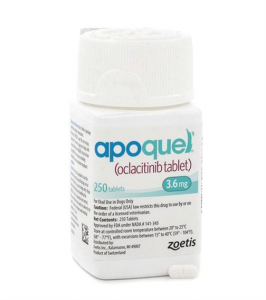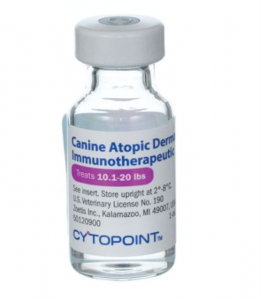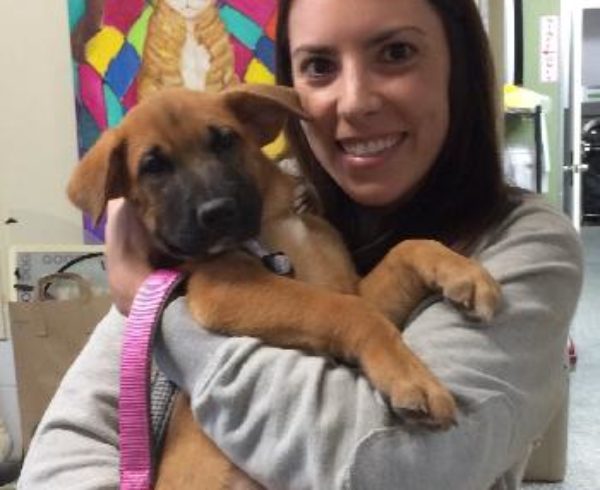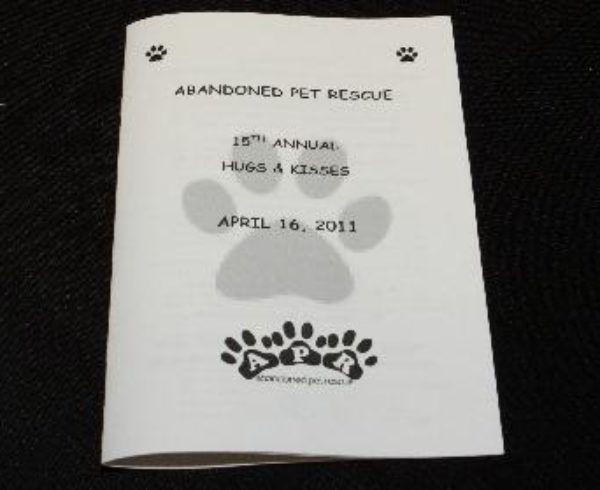If you’re like most pet parents with an itchy dog, it’s driving you nuts! It’s one of the most common challenges facing dog parents; how to relieve dog dermatitis that’s causing incessant itching, biting and licking, turning their happy, healthy and beautiful pup into a mangey looking, miserable mess. I can relate; I’ve been there, too.
It’s easiest to go to the vet, who will probably prescribe something like Apoquel or a Cytopoint shot and voila!, the itching goes away and everybody’s happy. But, what you may not know and can’t see, is what that Apoquel or Cytopoint is doing inside of your dog’s body. And, if you knew, you may make another choice.
It’s my promise to you to introduce what I’ve learned from trusted holistic vets, my own decades of experience with naturally healing my own pets and my clients and students successes, in the hopes you can be empowered with options that heal and don’t harm, too.
It’s Not The Skin Issues That Will Kill Them
Skin issues will rarely kill a dog. Why? Because the skin is the outermost organ of the body, so it’s the least likely to cause any deep internal damage to more important organ systems.
But, like the red light flashing on the dashboard of your car, the body is telling you there’s a problem inside. Some imbalance exists in your pet’s body that is being expressed through the skin.
What is it? As crazy as it sounds, it doesn’t really matter. You could experiment to see if it’s an allergy to grass or pollen or a type of food or something else. But, all allergies exists because the body’s immune system isn’t strong enough to ward off any potential irritants. A strong and balanced gut microbiome creates a strong immune system. A strong immune system creates a vibrantly healthy animal.
Our pet’s and our bodies are infinitely intelligent and are created to take care of and heal themselves. We so often get in the body’s way, over time causing a big toxic overload, until something’s gotta give and we or they get sick or develop a dis-ease.
But, the good news is, if you’re observant and educate yourself on the best, species appropriate nutrition and natural alternatives to pharmaceutical drugs, you can offset the everyday toxins your pets can’t avoid in today’s world.
And, those two skin allergy options the vet would recommend? Apoquel and Cytopoint are both going to suppress that expression of an imbalance through your dog’s skin, driving it deeper inside your pet’s body. You can see it; all you see if they’ve stopped itching. But it is there and needs a way to express itself, so it goes a little deeper, coming out as another symptom, another red warning light on the dashboard. Maybe it’s a digestive issue, maybe something else, but it will be something, eventually.
That is why sharing this information with you is so important, so you can avoid making mistakes that could seriously impact your pet’s health down the line.
The Common Go-To’s the Vet Prescribes & Why You Should Avoid Them

What is Oclacitinib Maleate & What Does It Do In the Body?

Oclacitinib maleate or Apoquel is an anti-allergy drug that suppresses the immune system. If hearing that giving this to your dog suppresses his or her immune system isn’t scary enough, listen to this.
How Apoquel works in the dog’s body is by suppressing the function of kinases or signaling compounds that the dog’s cells use to communicate with one another. These kinases are called JAK’s, and there are several different types of JAK’s working together to fulfill many important roles in the body like the following:
-
Acting as the body police against tumor formation
-
Controlling growth and development of the body
-
Helping to form white and red blood cells
-
Ensuring the optimum function of antibody-producing B cells and “policing” T-cells
-
Regulating the body’s inflammatory response
If you’ve taken my course on basic homeopathy and good nutrition, you know that a prolonged inflammatory response in the body can cause trouble, meaning everything from inflammatory bowel disease, asthma, or even cancer.
So, you see how important JAK’s are to your dog’s body functioning properly.
To put it plainly, if your dog takes Apoquel, he or she won’t get the benefit of functioning JAK’s. One of the JAKs’ jobs is destroying abnormal cells, prior to them forming tumors. So, if your dog is prone to cancer or mast cell tumors, they can proliferate, unchecked by the policing work of JAK’s.
If the scales of their immune system are tipped because it is so compromised by other factors like diet, drugs, environmental or emotional stresses, the formation of bacteria fighting white blood cells and oxygen transporting red blood cells is also compromised. Along those lines, the optimum function of B cells (antibody cells) and T cells (killer cells) is also affected.
Side Effects You Should Know About
There have been serious side effects recorded in dogs taking Apoquel. They are:
-
One dog developed low-grade B-cell lymphoma after 392 days on Apoquel.
-
They euthanized another 6 dogs because of suspected malignant growths; cancers that spread easily … but aren’t detected because of immune suppression…due to the Apoquel.
-
1 dog got euthanized after 450 days on Apoquel. The dog had a fluid-filled abdomen and chest and vets couldn’t explain why.
-
Two dogs each developed malignant tumors of the anal glands. One was topical and the other, an anal sac, both after only 210 and 320 days on Apoquel.
-
Two dogs each developed a Grade II mast cell tumor after 52 and 91 days.
-
One dog developed a low-grade oral spindle cell sarcoma, a painful oral cancer in dogs, after 320 days.
Side effects even include different types of skin disease, the very issue you’re trying to treat with Apoquel! Everything from demodectic mange to warts to cysts to swollen lymph nodes and more have been recorded in dogs as young as 6 and 12 months old.
Why would any of us who love our dogs want to put something that does this much damage into their body? This can be damage you may not see day to day and only see when it’s too late.
What is Lokivetmab & What Does It Do in The Body?

Cytopoint is the other common “solution” vets have to pruritis or skin issues. When your vet or veterinary dermatologist gives your dog a Cytopoint shot, here is what is happening.
Cytopoint targets the immune system but differently than Apoquel. It’s what’s called a synthetic monoclonal antibody. Our dogs, like us, have a lot of antibodies they produce to fight invaders like bacterial, fungal, viral and parasite infections. It does this by the antibodies attaching themselves to the foreign substances and neutralizing them. Like superheroes.
But, what happens if an antibody attacks one of its own? That is not a good thing and that’s exactly what Cytopoint triggers. It binds to and inactivates part of his or her immune system, specifically called Interluken 31 (IL 31), which is a cytokine.
Cytokine are proteins that include many different types of cells, including immune cells. IL 31 cytokines are produced in your dog’s body by mast cells, macrophages, T cell helpers and dendritic cells which are immune cells found in skin that boost immune responses.
By blocking this cytokine from doing its job, your dog may be more susceptible to contracting infectious diseases. IL 31 also helps the homeostasis of cells that create red blood cells and helps with the regulation of connective tissue.
A heartbreaking chronic disease called IMHA (Immune Mediated Hemolytic Anemia) can be the fallout of blocking IL 31, as can chronic pain involving the nervous system and its connecting tissues.
It may even trigger tumor growth by interfering with the regulation of immune and sensory nervous systems. And the best part, if this wasn’t enough? When IL 31 is triggered normally in a body out of balance, its immune response produces itching. Make sense the drug companies would look to suppress it to “cure” the itch?
Side Effects of Cytopoint To Make You Scratch Your Head
Cytopoint is produced by the drug company, Zoetis. On its site, here is the list of side effects of this drug (which they insist is not a drug at all):
-
Pruritis (as in skin allergies which produce the itch)
-
Dermatitis
-
Otitis Externa (ear infections)
-
Bacterial skin infections
-
Alopecia
-
And other effects like diarrhea, vomiting, anorexia, lethargy and more.
Here’s the thing. When you give your dog a pharmaceutical or take a pharmaceutical yourself and it stops something dead in its tracks, beware! That isn’t curing; that is palliation or suppression. A palliative drug will only handle the problem when you’re taking it; once you stop, the problem returns. Suppression causes a whole host of other problems, driving the imbalance deeper into more serious organs.
What Happens Now?

You have a problem and just bearing it, watching your dog suffer is not the answer. So, what do you do?
Luckily, there are solutions, ones that are holistic and will not suppress your dog’s system.
If the itching has been going on for a while, chances are it’s a chronic condition and would require balancing the imbalance in your dog’s body causing it.
That comes with good nutrition, homeopathy and other natural solutions.

Good nutrition means either a freeze-dried raw diet, and some healthy veggies and fruits. It can also be a home-cooked diet of lightly seared meats (so as to retain the live enzymes in the food, so important to good health) and adding some healthy vegetables. If you’re going to home-cook your dog’s food, make sure you are including the vitamins and minerals necessary for your dog to be healthy (AAFCO Guidelines). Finally, it can mean a fresh or frozen raw diet, which is the best, since it retains all of the live enzymes your dog’s body needs to thrive. Sometimes good nutrition alone can clear up a skin condition.

Once starting your dog on a healthy diet, you may want to try homeopathy. For chronic conditions, it’s a bit tricky as it’s a deeper issue in your dog, and it’s best to work with an experienced veterinary homeopath or a homeopathic practitioner. Learning the basics of homeopathy is a great way to have a safe yet powerful tool in your kit to keep your dog off of pharmaceuticals and learn how to heal holistically. It takes time and may require a couple of different remedies to conquer the itch, but you’ll have conquered it for good, helping the body rebalance itself. Reach out to me for more information on this.

Other ways to address chronic itching is with combined therapies, like nipping an itchy spot in the bud with a topical. Calendula cream works great for us and, like magic, clears up hot spots in minutes. You can find it in your local Whole Foods or on Amazon.
Dr. Deva Khalsa recommends this Chinese herb: Zhu Dan Tablets from Seven Forests. Here’s her recommended dosing:
-
½ pill to 1 pill twice a day for a smaller dog
-
1 pill two to three times a day for a medium dog
-
2 pills two or three times a day for a large dog
She recommends giving these with a meal.
Make sure your dog’s itch isn’t attributed to fleas and a flea allergy. We include a finely chopped 1/3 medium clove of garlic for each of our dogs in their breakfast meal each day. This, along with their good diets and strong immune systems wards off any fleas.
We used BetaThyme on one of our dogs and that helped. BetaThyme is a naturally formed steroid and you would follow the instructions on the label.
There are several other products on the market; feel free to reach out for any feedback you’d like on any of them.
Final word is always observe your dog. Notice if he or she starts itching after walks or after eating certain foods and that could be a great place to start, too. Even feeding our dogs raw, I’ve noticed one or the other may not do as well on certain meats as on others. You know your baby better than anyone. Watch and you’ll learn so much.
But, Apoquel and Cytopoint? After reading this post, tell me what you think in the Comments. Would you still give these to your dog? If yes, why? If no, is there a condition your dog has you feel may have been caused by or made worse by one of these drugs?


















